#lord higham
Text




bbc ghosts s3e5: something to share?
"father was very formal. he liked to be in charge and to be respected, but he was very kind of heart."
(requested by anonymous)
#is this the kind of thing you had in mind anon?#if you wanted something more specific/different/whatever let me know :)#i never considered taking gif requests but i guess i do now!#bbc ghosts#the captain#kitty ghosts#kitty higham#lord higham#does her dad have a name??#ben willbond#lolly adefope#my edits#my gifs
222 notes
·
View notes
Text
Thinking about making a victorian ghost oc but
1) I wanna make a dude, but there is such a lack of women that yeah I should make a lady
2) I havent educated myself on the Victorian era so would have to research a lot
#Ngl thinking about a servant who died in the house preparing the house for George's father or something bc it wasn't used for the years#Between the death of Lord Higham and George Button moving in#But also a painter or tailor
7 notes
·
View notes
Text
Outlander and ghosts crossover ideas
1st idea takes place between 1762-1763. Kitty and Eleanor are about 5-6 at that time.
Kitty and Eleanor’s dad is friends with Lord John and writes to him that he should visit him in his country estate
Lord John agrees to meet him and his wife and he brings Jamie
Lord John introduces Jamie to Kitty’s parents as James
Jamie then says that his actual name is Seamus (James in Scottish Gaelic) and explains that he’s from the Inverness area. He ask Kitty’s parents to just call him Jamie.
Lord John’s friend then introduces his little daughters Eleanor and Kathrine. The girls ask Jamie to call them Ellie and Kitty
Jamie becomes like a second dad to Kitty
Kitty ask what her and Eleanor’s name in Scottish Gaelic. He says it’s Caitrìona and Eilionoir
Jamie then tells Kitty he always wanted to be a father but his 1st child was born sleeping. She asked what happened to his wife. Jamie tells her that she is from the future and she traveled through some magical stones in in oder to project her and their unborn child from the battle at Culloden.
Kitty brags that she wants to go to the future
Jamie try to get Eleanor to stop being mean to her sister by telling a tale from his homeland about what will happen to bad girls but it doesn’t work as she doesn’t believe in silly little story
Kitty’s parents ask Jamie about his wife. He tells about her first miscarriage. Instead of telling about the stones, Jamie says that she miscarried again but this time she didn’t survive it.
The other one is that Claire meets the captain and Havers during WW2. Button house could of also been a hospital/recovery centre. Claire was a nurse so she could of visited Button to help the soldiers to recover
3 notes
·
View notes
Text
a couple of my favorite things abt ghosts s5
• gotta start with the obvious: Cap’s (James’). Death. Scene. this is television folks this is TELEVISION. everything sort of rushed to us at once, but not in a bad way-the intertwining of all the little details we’ve been wondering about since the start came so beautifully. the first look of reunion, the scars on the side of Havers’ face, the way it was confirmed that he *knew*, and he was smiling when he said it, “ANTONY”, “JAMES”, the SWAGGER STICK BEING HIS OH MY GOD. oh my GOD. phenomenally written, phenomenally acted, phenomenal. my roommates were probably very worried upon hearing the shrieks a few doors down
• Eleanor’s last words to Kitty being in the same episode as Barclay’s parenting conversation with Mike-unexpected depths to antagonists for the winnnnnn
• JULIAN’S MONOLOGUE JULIAN’S MONOLOGUE JULIAN’S MONOLOGUE JULIAN’S MONOLOGUE JULIAN’S MONOLOGUE
• the moments in which they were all standing together as the clock struck twelve
• Kitty being canonically a Higham!!
• THE LINE DANCING AT THE END OF THAT EPISODE. they knew what they were doing with that catharsis and it was the most beautiful thing in the world
• 🎶got a little safe. got a little safe in my house. got a little saaaaaaaaaafe🎶
• Mary still at least getting a moment in the opening credits
• Thomas Angus Thorne, the apparent Scotsman
• Larry playing opposite himself for an episode (and all the continued layers we got to Robin and Humphrey this season)
• “may i take your hands?” “are you going to kiss them?” GODDDDDD. the purest tenderness in the delivery of the first question and simplest hope in the delivery of the second. THOMAS YOU UTTER DARLING DOLT WAKE UP SHE’S RIGHT THERE.
• the plague ghost nightclub
• Fanny and her motorcycle moment
• “abba!”
• I’M GONNA MISS THIS SHOW SO DAMN MUCH. very much looking forward to the christmas special, baby Cooper, more shenanigans, more development, more kitmas (please lord please)
• an incredible season wonderful job everyone
#bbc ghosts#bbc ghosts spoilers#bbc ghosts series 5#bbc ghosts season 5#red lever#tv tag#six idiots#the six idiots#my loves#my faves#ben willbond#lolly adefope#mathew baynton#mat baynton#simon farnaby#martha howe douglas#jim howick#laurence rickard#larry rickard#charlotte ritchie#kiell smith bynoe
128 notes
·
View notes
Photo
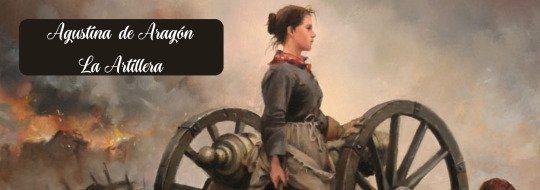
Agustina de Aragón, Casta Álvarez and other heroines of the siege of Zaragoza
In 1808, the Spanish city of Zaragoza was besieged by the armies of Napoleon Bonaparte. The Peninsular war was raging as the Spanish people resisted the French occupation.
Women distinguished themselves in defense of their homes. One of them was Agustina Raimunda María Zaragoza Doménech (1786-1857), also known as Agustina de Aragón.
Defender
In 1803, she married Juan Roca Vilaseca, a corporal in the Spanish Artillery. Since her husband had been stationed in Zaragoza in 1808, Agustina was present when the French troops besieged the city.
Many of the Spanish defenders of the strategic Portillo Gate had been wounded or killed following the French assaults. The enemy was beginning to storm the city. Agustina, who had been carrying food and water to the soldiers, stepped into the breach, retrieved a still-burning wick from the hand of a fallen gunner, and fired the cannon at the advancing French soldiers. Her courage rallied the defenders who repelled the assailants, thus saving the gate.
The Spanish Commander in Zaragoza, José de Palafox, heard of her bravery and rewarded her. Her exploit also won her international fame. Lord Byron wrote, for instance, a poem in her honor.
Zaragoza’s other heroines
She wasn’t the only woman to take arms. Another was Casta Álvarez (1786-1846). Armed with a bayonet, she defended the Sancho Gate and was later awarded a pension by King Ferdinand VII.
Manuela Sancho (1783-1863) fought to defend the San José convent, riffle in hand. María de la Consolación Azlor, countess of Bureta, (1773-1814) organized a battery to repel a French assault on her home. The names of Benita Portales, Juliana Larena, and María Lostal are also remembered. Women also nursed the wounded and brought food and drink to the soldiers. María Agustín (1784-1831) was, for instance, wounded when bringing ammunition to the defenders.
This first siege ended on August 14, 1808, but the French returned to besiege the city on December 19, 1808. Agustina wanted to fight but had contracted typhus and could only watch from her sickbed as the city was taken. Captured by the French, she and her son were forced to march to the frontier among a column of prisoners. She would probably have died if an officer had not placed her on the back of a mule. Agustina made it to Puenta de la Reina where she escaped. Her son died shortly afterward.
Ensign
Agustina reached the nearest headquarters of the Spanish army. She was made an ensign and served with her unit in Seville. She later fought in the defense of Tortosa and the battle of Vitoria, though her participation in the latter is subject to doubt.
After the end of the war in 1814, Agustina followed her husband to various military posts. After he died in 1823, she remarried to a doctor. She died in Ceuta on 29 May 1857.
Further reading
Esdaile Charles J., Women in the peninsular war
Fernandez Gilbert G., “Agustina de Aragón”, in: Bernard Cook (ed.), Women and war, an historical encyclopedia from antiquity to the present vol.1
Lawrence Tone John, “Aragón, Augustina”, in: Higham Robin, Pennington Reina (ed.), Amazons to fighter pilots, biographical dictionary of military women, vol.1
Navascués Alcay Santiago, “Casta Álvarez Barceló”
Solduga Francisco Javier, “La Artillera del Portillo”
#Agustina de Aragón#Casta Álvarez#Manuela Sancho#María de la Consolación Azlor#history#women in history#spain#spanish history#warrior women#napoleonic wars#peninsular war#siege of zaragoza#zaragoza#women warriors#warriors
51 notes
·
View notes
Text
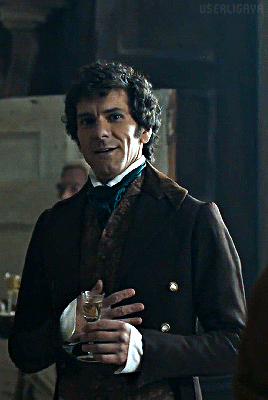
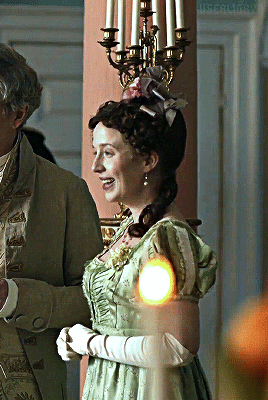
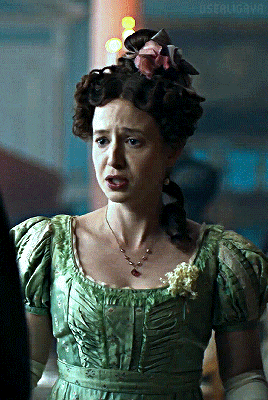


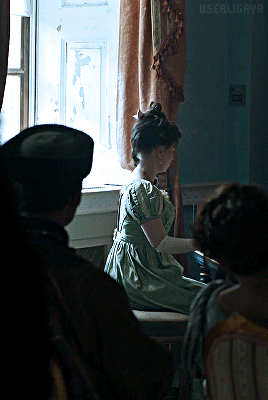


I looked forward to unveiling my new work, but most of all, I looked forward to seeing once again Lord Higham's daughter... my beloved Isabelle.
Holli Dempsey & Mathew Baynton as
Isabelle Higham & Thomas Thorne in
BBC GHOSTS (2019-) | 2.04
(The Thomas Thorne Affair)
bonus:

#bbc ghosts#thomas thorne#isabelle higham#mathew baynton#holli dempsey#them there#filmtvedit#bbcghostsedit#*the thomas thorne affair (02x04)#dakotasvibe#userligaya
144 notes
·
View notes
Text
people keep trying to figure out how higham house passed hands between kittys family and isabel’s family so quickly, was it a direct line inheritance, it was very quick, blah blah blah. honestly i just think that eleanor and kittys father just. left the house after kittys death for whatever reason and gave it to close family, maybe kittys uncle or smthn who was the lord higham we meet in 204. i really think it was simple as that.
#i’m so happy i was right about kitty being a higham#this is also very early morning posting for me hello#en#bbc ghosts#ghosts 5
35 notes
·
View notes
Text
Tag Game: 9 Favorite Characters



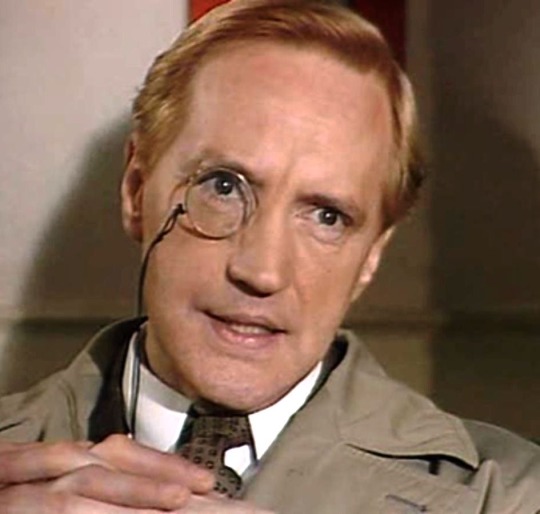





Thank you @ally-holmes for the tag!!
Not in order or really any thing other than the character who’ve been orbiting my brain the most recently
Soundwave; Transformers IDW
Herbert West; Re-Animator
Tarantulas; Transformers IDW
Lord Peter Wimsey; Lord Peter Wimsey books
Kitty Higham; BBC Ghosts
CB the Red Caboose; Starlight Express
Old Gregg; The Mighty Boosh
Shrignold; Don’t Hug Me I’m Scared
Reginald Jeeves; Jeeves and Wooster
I’m tagging @hugh-lauries-bald-spot @jumpin--bean @ghost-in-fools-garments @nnobodoodles @starleska @pop-squeak if you want to of course
15 notes
·
View notes
Text
I looked forward to seeing, once again, Lord Higham’s pussy
- Thomas Thorne
37 notes
·
View notes
Photo

The Most Honourable Charles Watson-Wentworth, 2nd Marquess of Rockingham, 2nd Earl of Malton, 2nd Viscount Higham, 7th Baron Rockingham and Lord Lieutenant of the West Riding in Yorkshire.
33 notes
·
View notes
Note
Hello! Of all the places you’ve been stuck around the house, which has been your favourite & least favourite?
Hello!! Now this is my sorta question, thanking you kindly. Lord know there’s been some doozy’s. 🗡️❤️
Most favourite: Can I have a favourite spot I’m dumped in for days, weeks, or even years at a time? Maybe. Being in the kitchen was fun back in the day, I guess. It almost felt like I was alive again in the Higham times, and very included what with all those servants and cooks. You may know my thoughts on inclusion.
I even got a glimpse of that pineapple before poor Kitty… y’know. I’d never seen one before, I could sense the excitement!! 🙊
Least favourite: Bloomin’ heck. When Button House got its first flushing loo for, uh, stinky pit turn sewer purposes. No matter what Robin tells you, I did NOT like that. Nor did I like being trapped under George Button senior on said first flushing loo. Thanks for the trauma, mate!
Humphrey x
11 notes
·
View notes
Text
sure, why not! a ghosts vine compilation.
#bbc ghosts#my edits#robin ghosts#humphrey bone#mary guppy#mary ghosts#kitty ghosts#kitty higham#fanny button#thomas thorne#the captain#captain ghosts#alison cooper#mike cooper#julian fawcett#pat butcher#good lord is that everyone#oh havers mention im sorry#lieutenant havers#vine#vine compilation
169 notes
·
View notes
Text

The following is the lineup for the polls by date, made using a random number generator. New characters introduced in chapter 199 will automatically be added to the end of the roster.
April 19th - April 26th
Chlaus
Rian Stoker
Lord Ackroyd's son
FOL Orphanage staff
Timber
Claude Faustus
Tanaka
Conny
Emily
Baldroy / Bard / Baldo
Finnian / Finny
Sharpe Hanks
Mabel
Burnett
April 20th - April 27th
Soma's elephant
Beast
Sophie Smith
Theodore
Finny's hat
Funtom Corporation's unicorn suit
Karl Woodley
Oscar
Chris Heathfield
Sieglinde Sullivan
Fred Abberline
Stella Rose
Charles Phipps
the orphan that called Sebastian an old guy
April 21st - April 28th
Nick
Joanne Harcourt
Purple House dorm master
Agni / Arshad Satyendra Iyer
Yana Toboso
Grete Hilbard
the Mad Dog of Venice
Abbie
Johnny
Mina
Rachel Phantomhive
Charles Phipps's chicken
Haku
Sascha
April 22nd - April 29th
Jumbo
Mrs. Mayell
Goethe
the Rowdy Count
Georg von Siemens
Margaret Connor
Al
Cedric Brandel
Mathilda Simmons
Wendy
Sam / Old Man Sam
Grelle Sutcliff
Ellery Nixon
Eric Slingby
April 23rd - April 30th
Edward Midford
Luka Macken
Queen Victoria
Lord Ackroyd
Layla
the other children in the lab Finny was kept in
Betty
Reaper trainees
Green House dorm master
Vincent Phantomhive
Drossel Keinz
Kelvin
Lawrence Bluewer's sisters
Charles Grey
April 24th - May 1st
Margaret Turner
Akashi
Snake
Edgar Redmond
Derrick Arden
Ronald Knox
Aurora Society member
Bloodbath Johnny
Wilde
Soma Asman Kadar
Claude's birds
Sebastian's silverware
Chef Rickman
Susannah Connor
April 25th - May 2nd
Susan
Artie
Damian
John Brown
Saneatsu Nekoma
Peter
Lawrence Anderson / Pops
Chef Wollest
Chris Heathfield's maids
demon Crow
Nina's assistants
Ludger
Prince Albert puppet
Miranda
April 26th - May 3rd
Blavat Sky
Vicar Rathbone
Julius Pitt
walking stick shopkeeper
Grimsby Keane
Ciel's horse
Edward V
Jay the Undertaker
Gregory Violet
Canterbury
Jeremy Rathbone
Doctor
the cat from the live action movie
Henry Barrymore
April 27th - May 4th
Lawrence Bluewer
Prince Albert
Higham
the Panzer
the train kidnapper
Donne
Heinrich
Chef Lach
Dagger
Doll / Freckles
Sam's grandson
Bitter Rabbit
Japanese man with a katana
"Ciel" Phantomhive / Our Ciel / O!Ciel
April 28th - May 5th
Mey-Rin
Undertaker's mourning lockets
Webster
Purple House prefect from Vincent's year
Patrick the Grey Wizard
Diedrich
Johann Agares
Bronte
Carter
Othello
the cultists
Baldroy Jr.
John Brown's horse
Sphere Music Hall staff
April 29th - May 6th
Jackknife Haywood
Nina Hopkins
William's death scythe
Angela Blanc
Wolfram Gelzer
McDowell
Ronald's lawnmower
Arthur Randall
Aleister Chamber / Viscount of Druitt
Keats
Annie
Terry
Hao
Maria
April 30th - May 7th
Irene Diaz
Polaris
beggar boy that Soma gives a necklace to, mother, and baby brother
kenpo master
Red House dorm master
Ran-Mao
Shiori Genpou
Cedric K. Ros
Lau
Clayton
William T. Spears
Patrick Phelps
Japanese woman with a lunchbox
Oliver
May 1st - May 8th
Arthur Conan Doyle
the bear
Grelle's chainsaw
Trancy / Former Head Trancy
Richard
Aristocrat of Evil with the scarred face
the archeologist
Joker
Jan
the cats Sebastian rescues from the rain
Hilde Dickhaut
Rin
Cloudia Phantomhive
"Deer"
May 2nd - May 9th
King's Bear prostitutes
McMillan
"Her"
Undertaker's death scythe
Daniel
Ginny
Sieglinde Sullivan's father
Charles Bennett Sato
demon Ciel
Ada
Arnold Trancy
Ciel Phantomhive bizarre doll / Real Ciel / R!Ciel
Arihito Genpou
Thomas Wallis
May 3rd - May 10th
Chef Tarpin
Queen Victoria (Season 1)
Lau's ladies
Fennian
Harold West Jeb
Nicholas
Professor Sullivan / village crone
Anne Drewanz
CGI horses / driver
Margaret Connor's father
Ciel Phantomhive child / R!Ciel child
Jane
Paula
Wordsworth
May 4th - May 11th
Maurice Cole
Alexis Leon Midford
bizarre dolls
the turnspit dog
the "werewolves"
O!Ciel's land renters
priest
Pluto
Sebastian the dog
Red House prefect from Vincent's year
the Sebastian Roomba
bizarre doll horses
Baldroy's cow
Undertaker
May 5th - May 12th
Hanae Wakatsuki
the iceberg
Alan Humphries
Ash Landers
Thompson
Snake's unnamed snakes
Milly
Munemitsu Aoki
Alois Trancy / Jim Macken
Elizabeth Midford / Lizzy
Aurora Society purified water seller
Drossel's dolls
the timetable guy
Herman Greenhill
May 6th - May 13th
Azzurro Vanel
William's pigeons
Joanna
Reaper managers
Dove
Countess Trancy and her baby
German countryman
Scotland Yard officers
Haku's henchman
Lorraine McDowell
demon "pet" (the xenomorph)
Hannah Annafellows
Angelina Dalles / Madam Red / Aunt An
Pitt
May 7th - May 14th
Vincent Phantomhive's staff
Paul Jones
Francis Midford
Sebastian Michaelis
Cheslock
Phantomhive family ring
James
Edward Abberline
Baron Ridley
Sebastian's owl
17 notes
·
View notes
Note
top five female characters!
1. Kitty Higham (BBC Ghosts)
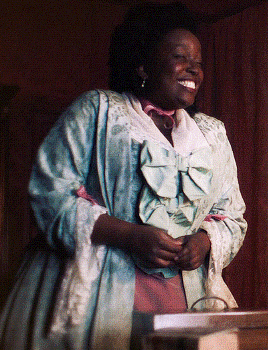
2. Éowyn (The Lord of the Rings)

3. Éponine (Les Miserables)

4. Hera Syndulla (Star Wars Rebels/Ahsoka)

5. Orla McCool (Derry Girls)

#ask#anonymous#it was hard to narrow it down to 5 faves of all time#but these are probably the fictional women who have made me feel the most feelings ❤️
2 notes
·
View notes
Photo
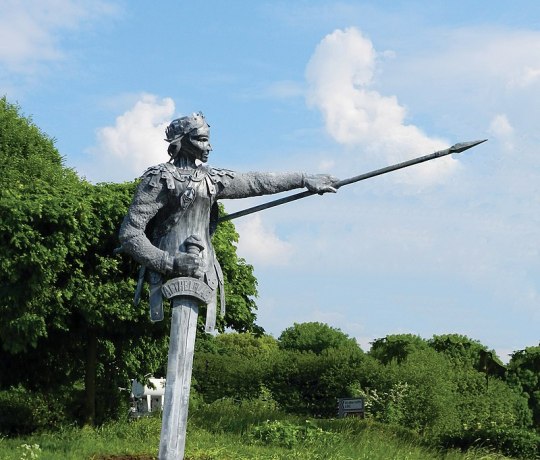
The new Æthelflaed statue outside Tamworth Railway Station, erected to commemorate 1,100 years since her death in Tamworth. Her spear points visitors towards the town centre and Tamworth Castle.
Æthelflæd, Lady of the Mercians (c. 870 – 12 June 918) ruled Mercia in the English Midlands from 911 until her death. She was the eldest daughter of Alfred the Great, king of the Anglo-Saxon kingdom of Wessex, and his wife Ealhswith.
Æthelflæd was born around 870 at the height of the Viking invasions of England. By 878, most of England was under Danish Viking rule – East Anglia and Northumbria having been conquered, and Mercia partitioned between the English and the Vikings – but in that year Alfred won a crucial victory at the Battle of Edington. Soon afterwards the English-controlled western half of Mercia came under the rule of Æthelred, Lord of the Mercians, who accepted Alfred's overlordship. Alfred adopted the title King of the Anglo-Saxons (previously he was titled King of the West Saxons like his predecessors) claiming to rule all Anglo-Saxon people not living in areas under Viking control. In the mid-880s, Alfred sealed the strategic alliance between the surviving English kingdoms by marrying Æthelflæd to Æthelred.
Æthelred played a major role in fighting off renewed Viking attacks in the 890s, together with Æthelflæd's brother, the future King Edward the Elder. Æthelred and Æthelflæd fortified Worcester, gave generous donations to Mercian churches and built a new minster in Gloucester. Æthelred's health probably declined early in the next decade, after which it is likely that Æthelflæd was mainly responsible for the government of Mercia. Edward had succeeded as King of the Anglo-Saxons in 899, and in 909 he sent a West Saxon and Mercian force to raid the northern Danelaw. They returned with the remains of the royal Northumbrian saint Oswald, which were translated to the new Gloucester minster. Æthelred died in 911 and Æthelflæd then ruled Mercia as Lady of the Mercians. The accession of a female ruler in Mercia is described by the historian Ian Walker as "one of the most unique events in early medieval history".
Alfred had built a network of fortified burhs and in the 910s Edward and Æthelflæd embarked on a programme of extending them. Among the towns where she built defences were Wednesbury, Bridgnorth, Tamworth, Stafford, Warwick, Chirbury and Runcorn. In 917 she sent an army to capture Derby, the first of the Five Boroughs of the Danelaw to fall to the English, a victory described by Tim Clarkson as "her greatest triumph". In 918 Leicester surrendered without a fight. Shortly afterwards the Viking leaders of York offered her their loyalty, but she died on 12 June 918 before she could take advantage of the offer, and a few months later Edward completed the conquest of Mercia. Æthelflæd was succeeded by her daughter Ælfwynn, but in December Edward took personal control of Mercia and carried Ælfwynn off to Wessex.
Historians disagree whether Mercia was an independent kingdom under Æthelred and Æthelflæd but they agree that Æthelflæd was a great ruler who played an important part in the conquest of the Danelaw. She was praised by Anglo-Norman chroniclers such as William of Malmesbury, who described her as "a powerful accession to [Edward's] party, the delight of his subjects, the dread of his enemies, a woman of enlarged soul". According to Pauline Stafford, "like ... Elizabeth I she became a wonder to later ages". In Nick Higham's view, medieval and modern writers have been so captivated by her that Edward's reputation has suffered unfairly in comparison.
83 notes
·
View notes
Text
Book 2
Chapter 12 - Richard Talketh With Ralph Concerning the Well at the World's End. Concerning Swevenham
Text
Audio
Synopsis:
Ralph and Richard discuss what's wrong with Ralph, and the two come up with a plan.
Summary:
“In the land and the thorp where I was born and bred there was talk now and again of a thing to be sought, which should cure sorrow, and make life blossom in the old, and uphold life in the young." "Yea," said Ralph, looking up from his tears, "and what was that? and why hast thou never told me thereof before?" "Nay," said Richard, "and why should I tell it to the merry lad I knew in Upmeads? but now thou art a man, and hast seen the face of sorrow, it is meet that thou shouldest hear of THE WELL AT THE WORLD'S END."
The next morning, Blaise went about his business, visiting the men of the Port at the Guildhall.[1] he asked Ralph to come with him, but he would not, and so Ralph stayed in the hall of the inn and sat thinking sadly while people came and went, but he heard nothing about the Well at the World’s End. He passed the next two days like this, except that Richard was among those who came to the hall and he talked to Ralph at times. That is to say, he spoke and Ralph acted somewhat like he was listening.
Now, as it was said before, Richard was old and wise and he loved Ralph greatly, likely more than he loved Lord Blaise, his proper master, for he had no mind for business or anything about it. So he stayed with Ralph and saw that he was sad and weary-hearted, so on the sixth day of their time at Whitwall,[2] when all the merchants were gone about their business and it was just him and Ralph in the hall, he said to Ralph: “This is not a prison, my lord.”
“So?” said Ralph.[3]
“If you doubt it,” said Richard, “let’s go to the door and see if they have turned the key or shut the bolt on us.”
Ralph smiled faintly and stood up, saying: “I will go with you if you want, but I think I will be a dull companion for you today.”
“Would you have been a better one yesterday, lord? Or the day before?”
“No,” said Ralph.
“Will you be a better one tomorrow?”
Ralph shook his head.
“Oh,” said Richard, “but you will be, or you may call me a fool.”
“You are kind, Richard,” said Ralph, “and I will come with you and do what you ask, but I must tell you that my heart is sick.
“Yes,” said Richard, “and you do not have to tell me that, dear youngling; anyone passing by can see that. But come on, let’s go.”
So they went into the street and Richard brought Ralph to the market and showed him Blaise’s booth (for he was doing quite well), but Ralph would not go near in case his brother wanted to drag him into a conversation. They went to the Guildhall which was both large and beautiful, and smelled like new-carved oak (for it was not yet painted), which reminded Ralph of his childhood when he would hang around the porter’s new house at Upmeads while it was being built.[4] Then they went to the Great Church and heard a Mass at the altar of St Nicholas, Ralph’s saint. It was a very pretty church, and also somewhat new, since Whitwall’s rise to prominence was so recent, and its altars were better than any Ralph had seen at Higham on the Way.
But when they came out of the church, Ralph looked at Richard with a blank and tired face, as if asking “What next?” And in truth he looked so tragic that Richhard, despite his concern for him, could hardly hold back his laughter.
But he said: “Well, foster son (for you are pretty much that to me), since this fair city does not please you, let’s go further out.”
So he led him out of the marketplace and brought him to the east gate of the town, which was called Petergate Bar,[5] and they went out and into the meadows under the walls, stopping at a little bridge over one of the streams—for it was a land of many waters. There, they sat down in a secluded spot, and Richard spoke to Ralph.
“Lord Ralph, it would be a shame if the sons of Upmeads made little or nothing of themselves. Now, as for my own master, Blaise, he has the makings of a noble merchant, but not of a noble knight; though he says that when he is rich he will abandon merchantry—though I’m sure he won’t. As for the others, lord Gregory is no better—and maybe worse—except that he will never be rich, having no self control, while lord Hugh is is likely to be killed in some meaningly squabble, unless he turns back to Upmeads quickly.”
“Yes, yes,” said Ralph, “What about it? I didn’t come here to listen to you badmouth my relatives.”
But Richard continued: “As for you, lord Ralph, I expended something from you, but now I’m not so sure. Your heart seems to be dead within you, and you must tend to it or else the body will die, too.”
“All right,” said Ralph.
Richard continued: “I am old now, but I was once young, and I saw and survived many things before I came to Upmeads. I am old, and I cannot feel certain hopes and pains that young men can, but I bought knowledge of them with experience, and I have not forgotten. By this, I guess that your dreariness is about a woman. Isn’t it?”
“Yes,” said Ralph.
“Now then, tell me about it, and your heart will lighten a bit.”
“I will not tell you,” said Ralph. “Or rather, to speak truly, I cannot.”
“Yes,” said Richard, “and though it would be easier now for me to tell you all the griefs of my life than it would be for you to listen to them, I do believe you. But maybe it would be easier for you to tell me something you want.”
“I want to die.” And he began to cry then.
But Richard said to him, smiling kindly: “That road is open to you on any day of the week. Why have you not taken it already?”
Ralph did not answer.
“Is it because you hope you will want something? If not today, then tomorrow, or the next day, or the next?”
Still Ralph said nothing, but he cried.
“Maybe I can help you hope, though you may think my words are crazy. In the land and town where I was born and raised, there was talk now and then about something to be sought, which would cure sorrow, make life blossom in the old, and uphold life in the young.”
“Yes?” said Ralph, looking up from his tears, “And what was that? And why have you never told me about it before?”
“What reason did I have to tell that happy young boy I knew in Upmeads? But now you are a man and have seen the face of sorrow, it is proper for you to hear about THE WELL AT THE WORLD’S END.”
Ralph jumped to his feet as Richard spoke, and he cried out eagerly: “Old friend, where were you born and raised?”
Richard laughed and said: “See that? There is still some distance between you and death! But turn around and look straight over the meadows past that willow and tell me what you see.”
“I see the plains spread out and a river running through it, with little hills past the water and the blue mountains beyond them. There is still snow on the mountaintops, though it is early July.”
“Yes,” said Richhard; “And do you see on that first little hill past the river, where a great grey tower rises above all the houses near it?”
“Yes,” said Ralph. “I see the tower and the houses, though they are small.”
“That is so,” continued Richard. “That tower is the Church of Swevenham, which is in honor of the Seven Sleepers of Ephesus;[6] and the houses are the houses of a little town. What does that have to do with me? Well, I was born and raised in Swevenham, and indeed it was I who brought lord Blaise here to Whitwall, saying that it was a good place for merchants and because I wanted to see the little town and its great grey tower once more. Really, I didn’t lie—your brother is happy here, piling up coins upon coins. You really should go see his booth, fair lord; it is a pretty sight.”
But Ralph was pacing back and forth and he turned to Richard and said: “That’s all very good, but what about the Well at the World’s End?”
“I was going to tell you something that may or may not be worth noting: when I lived in Swevenham and was only eighteen years old—and now I’m sixty eight—two young men and one young woman from our town set out to see that Well. They knew a lot of lore about it, which they had learned from an old man, a relative of one of them. I never met this old man because he lived way off in the mountains, and these men were five years older than I was, so I was still a child when they grew up, and I didn’t pay attention to these sorts of things, just playing games and (and most of all) playing war and battle. God knows I’ve had all I can stomach of it since those days! However, I remember them setting out. They had a pack mule with them to carry supplies for the wilderness, but they went on foot, crowned with flowers and with pipes and drums heralding their departure, and many people came to see them off. By St Christopher! I can see it all as if it were yesterday. I was sad about the young lady’s leaving because although I was a boy, I had loved her, and she had let me kiss and fool around with her, though not for long.[7] Now, I remember that they had asked our priest, Sir Cyprian, to bless their departure, but he declined, for he believed that such a quest came from the inspiration of the devils, and was a memory of ancient, heathen practices.[8] As for me, I didn’t really pay attention, except that I was saddened that my white-bosomed, sweet-breathed friend was leaving.”
“What happened to them?” asked Ralph, “Did they come back?”
“I don’t know; I was tired of Swevenham after that and so I strapped on a sword and put a spear on my shoulder and went to the Castle of the Waste March,[9] sixty miles from Swevenham, and the Baron took me in and I joined his forces. There’s almost as little to be gained in my telling you about those deeds as there was in my doing them. But until now, I had never seen the grey tower of Swevenham again.”
“I should head for Swevenham right away,” said Ralph. “Will you come with me? It only looks like it’s four miles from here.”
Richard stayed quiet and furrowed his brow as he thought about this, and Ralph waited until he responded: “Foster-son, as I’ll call you, you know how it is with men from upcountry: that they’re most likely to tell a story if they’re not badgered about it. I think it would be best if I went to Swevenham alone, and better yet if I go on your behalf rather than for myself. Now, tomorrow is Saturday,[10] which is the market day in Whitwall, and I’m still young enough that some of my old friends should be alive and about in Swevenham: and if that’s the case, there will be at least one in the market tomorrow, and I will be there to find him. Then I’ll go back to Swevenham as a well-loved guest, and while I am there and talking about my doings and asking others about theirs, I’ll find out if there’s any new of the Well at the World’s End. How does that sound?”
“Yes,” Ralph said, “but how long will that be?”
“I will come back quickly if I find nothing, but if there’s anything to learn, I’ll stick around; so be patient.”
“And what should I do now?”
“Pass the time,” said Richard. “And to start, let’s go back and see your brother’s booth in the marketplace: it’s the bottom floor of a nice house which he is looking to buy, and he will marry a wife and settle in Whitwall, if things keep going this way. They have already given him freedom within the city and a brother of the Traveling Knights, for he is not only a charismatic man, but also he now no longer hides that he is of the family of Upmeads.”[11]
Notes:
[1] May refer to a port on the river where ships dock, but (as we’ve had no mention of boats anywhere the river seems to be pretty shallow at places), it’s more likely people who deal with merchants entering the town to register their goods and collect import taxes.
[2] Six days! That’s the biggest time-skip so far, but we still have all days accounted for as of yet.
[3] I should have made this note way earlier, but I wanted to say something about dialog tags. The style of dialog tags has changed a lot over the years and tends to be much more varied in terminology, though less varied in position. Morris places them before, during, or after a character’s speech, while we mostly put them in the middle (“Thanks,” said Ralph, “but no thanks.”) or at the end of speech (“I’m sad,” said Ralph.), but in this I often encounter dialog tags at the beginning (Ralph said: “I miss my horse.”), which aren’t used as much in modern writing, and tend to give a different feel to things. I often (but not always) restructure things. Also of note: modern writing tends to use a lot more descriptive speech words (“whined,” “shouted,” “mumbled”) but this story uses fewer, different words. Morris primarily uses “spake,” “quoth,” and “said” (all of which mean basically the same thing). I edit dialog tags to make them sound more natural to modern readers, but do not change verbiage to add emphasis or emotion. “Cried” is also used some, which I tend to translate as “shouted” (to avoid confusion with the other meaning of “to cry”). Basically, if I get repetitive on the dialog tag verbs, it’s modern and archaic styles not matching up and me not having enough neutral speech words to use.
[4] The “porter” is referred to as the “water-reeve,” and “porter” is my best guess. A “reeve” is an official in charge of something, Upmeads has a river, I assume the water-reeve is in charge of it somehow. Also, the verb used to describe Ralph’s loitering is “hang about,” which I updated slightly but is still funny and modern-sounding to me.
[5] Some googling turns up that “Petergate” is a street name in York (and elsewhere, probably), and “Bar” is a word for “gate” in place names (in England).
[6] “Yonder tower is of the Church of Swevenham, which is under the invocation of the Seven Sleepers of Ephesus.” “Under the invocation” is a bit murky, and I haven’t been able to find a specifically defined reference to a church being “under the invocation” of someone or something, so I took a swing at it. As for the Seven Sleepers, there’s a story in Catholic mythology about seven young people who fled Ephesus (in modern-day Turkey) to avoid Roman persecution of Christians (like 200AD, I think?). Anyway, they went into a cave and slept, waking up some centuries later (number of sleepers and years slept varies). Not much else to say. Oh, the story also appears in the Quran.
[7] “I was sorry of the departure of the damsel; for though I was a boy I had loved her, and she had suffered me to kiss her and toy with her; but it was soon over.” I guess my one comment is that he stated that the two young men were five years older than he was, but did not mention the young woman’s age. In any case, although he refers to himself as a “boy” here, if you reread his speech, he was 18 when this all happened (not 13 with them at 18, which was my first, confused interpretation). Anyway, way to go, Richard, making out with an older girl.
[8] More intriguing views of the Church. Priests (and monks) seem to have a poor opinion of the Well at the World’s End, despite the story’s clear religious leanings. It’s an interesting internal conflict, one that I’ve pointed out before and will continue to point out going forward.
[9] A cool name for a castle. To explain the name a bit: “waste” refers to wilderness areas, especially those lacking in natural supplies, and “march” refers to a border territory. Basically, the castle is on the edge of a wasteland, and is known for its position there.
[10] And we have a day of the week! It’s Friday, July 11th, which gives me a list of possible years this takes place. Well, sort of. This is the medieval period, so it uses the Julian calendar… I’m a pretty big nerd, but calendars aren’t my strong suit. Also turns out there are a lot of years in the medieval period where July 11th was a Friday. I intend to put together a calendar timeline, but not tonight because I’m tired.
[11] A few notes: Richard talks differently from other characters? He has a tendency to use extended metaphors (example: he talks about going and finding out how things are in Swevenham as a farmer checking on the condition of a field), which I excluded because I’m tired and didn’t want to re-write in an understandable way. Maybe I’ll go back and change that later. He also says of Blaise that “they have already bidden to the freedom of the city, and to a brother of the Faring-Knights.” The first part means that the city officials trust Blaise and he’s been given clearance to do business and such in Whitwall (he’s a foreigner, so he would have originally been subject to restrictions and might have been barred from owning property). As for the second part… Uh, I’m not sure. My guess is the “Fairing-Knights” is a group of knights in the city that accompany merchants for protection, and he’s been assigned one of them to help him do business.
[Map] My initial reckoning was that Swevenham was east of Whitwall, due to the flow of things following the river so far, Ralph and Richard went out the east gate, and also because it’s described as having mountains beyond it (we will find mountains east of Whitwall soon), but on re-reading, I believe it might actually be to the north, since it’s described as being across the water from Whitwall, though which water that is is not specified (and there are a lot of streams in the area). Assuming it’s the Swelling Flood, Swevenham is probably north of Whitwall. I also placed the Castle of the Waste March to the north (about even with Wulstead), but we’re not given any indication of direction for it (north puts it closer to Upmeads though, which would help Richard end up there). I know I said I was going to revise the map, let’s just pretend I did (actually I think I’m going to wait until we hit the mountains and then revise this whole first section).
Map:
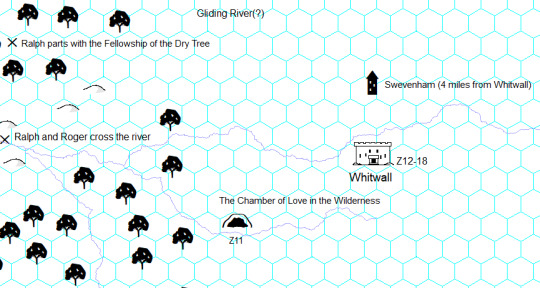
2 notes
·
View notes